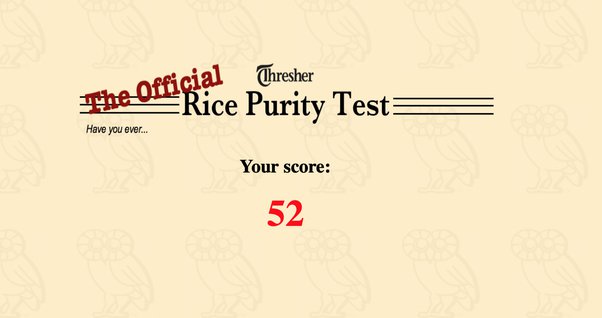In the space of social coordinated effort and individual examination, the Rice Flawlessness Test stays as a curious idiosyncrasy, offering individuals a surprising point of convergence through which to consider their past experiences and irreproachability. The test's score dispersion, one of its many features, is an intriguing look at the variety of human interactions and behaviors. In this article, we dive into the Rice Flawlessness Score Transport for young fellows, revealing models, examples, and pieces of information that shed light on the swarm ways got by individuals on their trip through life.
Understanding the Rice Faultlessness Test
Preceding plunging into the intricacies of score allotment, it's pivotal for handle the core of the rice purity test itself. This test, which originated at Rice College, has grown into a widespread social phenomenon, transcending its university roots to become a well-known pastime among young adults worldwide. The test consists of a survey that highlights statements or prompts about various aspects of life, such as personal relationships, social activities, academic respectability, substance abuse, and individual behavior.
Individuals are drawn nearer to show whether they have anytime taken part in each recorded development by picking “Yes,” “No,” or “No Comment.” The scoring system vacillates depending upon the type of the test being taken, with each “Yes” response usually consigned a particular number of core interests. The ensuing score gives a numerical depiction of a solitary's level of guiltlessness or experience, offering pieces of information into their past approaches to acting and social norms.
Exploring Score Scattering
In like manner with any verifiable assessment, examining the scattering of Rice Flawlessness scores offers significant pieces of information into the range of human experiences and approaches to acting. For young fellows, score assignment can contrast comprehensively, impacted by components, for instance, adolescence, peer influence, social establishment, and individual characteristics. While some could parade high scores expressive a more safeguarded or restricted lifestyle, others could have lower scores reflecting a more vital degree of life experience or deviation from social norms.
Rice Immaculateness scores for young men typically follow a bell-shaped pattern, with the majority of individuals clustering around the middle range. This recommends that most young fellows have taken part in a mix of both irreproachable and more valiant approaches to acting, discovering a concordance among comparability and examination of some sort or another. In any case, people with particularly high or low scores in contrast with their companions are alluded to as anomalies at the two closures of the range.
Factors Influencing Score Allotment
A couple of components add to the dissemination of Rice Prudence scores among young fellows, shaping their viewpoints, approaches to acting, and significant experiences. These factors include:
Social Support: Cultural norms and values have a significant impact on people's attitudes toward various behaviors. Young fellows from moderate establishments could have higher scores, reflecting a more conspicuous emphasis on restraint and adherence to traditional characteristics, while those from extra liberal establishments could have lower scores, reflecting a more indulgent disposition towards experimentation.
Peer Effect: Young men can be headed to adjust to bunch standards or take part in dangerous ways of behaving to find a place with their friends by peer strain and social elements. Boys whose friends are more conservative may have higher scores, whereas boys whose friends are more adventurous or rebellious may have lower scores.
Individual Characteristics: Individual convictions, norms, and moral convictions expect a basic part in framing young fellows' approaches to acting and decisions. Those with profound sentiments or a serious adherence to individual characteristics could have higher scores, reflecting a guarantee to staying aware of their irreproachability and dependability. Then again, young fellows who center around confidential examination and intrigue could have lower scores, reflecting a preparation to stretch boundaries and challenge social principles.
Encounters Throughout everyday life: Young men's perspectives toward different ways of behaving and probability of taking part in those ways of behaving can be impacted by private encounters, both positive and negative. Young fellows who have had positive impact, serious areas of strength for models conditions, and progressing enlightening experiences may will undoubtedly have higher scores, while individuals who have stood up to setback, injury, or companion strain may be more disposed to cut down scores.
Translating Score Allotment
Understanding the appointment of rice purity test among young fellows requires nuance and setting, as scores alone don't recap the full story of a solitary's experiences or character. A high score doesn't be ensured to compare to moral power or innocence, nor does a low score infer moral decadence or ferocity. In light of everything, scores should be viewed as an impression of individual choices, values, and life conditions, formed by a stunning exchange of factors.
Moreover, it's significant for approach score allotment with empathy and understanding, seeing that individuals could have genuine purposes behind their approaches to acting and experiences. Participating in receptive discourse, which promotes mutual respect, compassion, and support for one another's endeavors, is more beneficial than condemning based on scores.
End
The Rice Immaculateness Score Distribution for young men provides an enthralling look at the intricate web of human interactions and behavior. The dispersion of scores mirrors the assortment of life ways taken by people, from earliest stages to encounter, adjustment to investigation. We gain a deeper understanding of the intricacies of human instinct and the group influences that shape young men's perspectives, ways of behaving, and valuable encounters by investigating the factors impacting score circulation and deciphering scores with subtlety and sympathy. Ultimately, the Rice Ethicalness Test fills in as a catalyst for reflection, talk, and sorting out, inviting us to research the profundities of our own experiences and embrace the assortment of the human experience.






